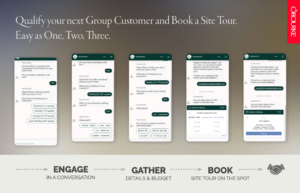How Conversational Marketing Can Increase Bookings for Hotels

Hotels are always looking for new ways to engage with prospective travelers and increase hotel bookings — and now more than ever, people want answers in real-time.
Conversational marketing is one way that hotels can do this. By speaking directly with their travelers or guests through their hotel website and messaging platforms, hoteliers can provide information about the destination and answer questions about the property. The end result is a better informed and more connected traveler. As the demand for instant results and emerging technology have converged, conversational marketing has allowed hotels to utilize chatbots to make it easy for travelers to find everything they need before booking a room.
These days, consumers across the world are used to shouting out questions for their virtual assistants. According to data, there are 4.2 billion virtual assistant devices in use, from Amazon’s Alexa to Google Assistant. The ease of obtaining information has carried over into business. Consumers likewise now expect quick answers from companies — and they’re responding. Research done by Juniper Research projected the total number of global chatbot interactions to reach 22 billion by 2023, up from an estimated 2.6 billion in 2019.
Chatbots not only improve the customer experience, but they also help hotels operate more efficiently, and — when done properly, chatbots can interact with your guests as if they were speaking to someone on your team.
Why chatbots are important for hotels
Chatbots are computer programs that use artificial intelligence (AI) to simulate human conversation. When we talk about chatbots we’re referring to a wide offering of software and messaging platforms that can be implemented on your hotel website and strategically created to accomplish whatever goals your hotel has in assisting travelers or guests virtually.
There are two ways to think about chatbots: as a solution for customers and as a tool for hoteliers. As a solution for travelers, chatbots can help with customer service. Customers can receive instant answers to their questions (FAQs), make requests, or even book a room without human assistance. As a hospitality marketing tool, chatbots can offer insights into customers’ needs by collecting data. Chatbots can collect information such as common questions and preferences to provide targeted offers and solutions. Chatbots can analyze customer behavior over time in order to recommend the best answer next time the bot is used or even generate personalized information such as a reservation number or check-in dates.
For hotels, chatbots serve two key purposes: save costs by handling some customer service activities more efficiently and acquire new customers using more personalized marketing techniques. Chatbots can provide an interactive and customizable customer experience through a more seamless interaction with the hotel.
Chatbots are already being used by hotels to handle basic interactions such as making reservations or checking availability on a particular date. By using a chatbot, hotels can save time and energy on customer service while providing instantaneous results for travelers. In addition, chatbots can be used to reduce customer service costs and thus increase profitability.
There is a lot to consider when it comes to integrating a chatbot into your hotel website. The benefits of a chatbot are oftentimes clear. As mentioned previously, many hotels find chatbots and conversational marketing useful for customer support and self-service. Chatbots don’t need time off, so they’re available 24 hours a day and 7 days a week, even when it would otherwise be difficult for a human to answer a guest’s questions. The use of chatbots also allows companies to reach and service more people at once with less effort. A study conducted by Forrester Research and Oracle found that businesses save as much as $11 per contact with self-service.
According to research by Superoffice, fast response times were found to be the most important customer experience factor. Put together, chatbots and rapid response times lead to easier customer service, increased conversion rates, and higher engagement rates.
But that doesn’t mean chatbots are perfect for every situation. As with any technology, there are some disadvantages to using chatbots. Unlike a receptionist on the phone or a live chat (which is different from a ‘bot’), automated chatbots can’t always provide the same level of support as a human because they are limited in their knowledge, language processing, and understanding. For example, chatbots can’t handle customer complaints that involve complex topics. Another drawback is that conversations with chatbots can sometimes be long-winded, repetitive, and impersonal. For example, if a user has already booked a room, they may not want to answer the same questions again in order to get the answer they’re looking for.
In these instances, or when a chatbot isn’t designed strategically, people can feel manipulated or deceived by chatbots because there is no human interaction involved. This could lead travelers to have a negative customer service experience or, worse, look for another hotel.
Although chatbots hold great potential in terms of improving customer service for hotels, their success depends on how hospitality marketers tailor them to their hotel’s specific industry needs, budget availability, and customer service strategy.
Having a strategy to interact with prospective guests
There is a lot to consider when implementing a chatbot on a hotel website. Most hotels work with a strategic partner to identify, develop, and implement a chatbot. Throwing a chatbot integration onto a hotel’s CMS and putting an icon in the bottom corner isn’t enough — providing a solid and useful experience takes a strategic approach.
All hoteliers should consider the following:
- What platforms does your hotel need to support in addition to your website? Many hotels utilize popular messaging services including Facebook Messenger, Twitter, Google Assistant, WhatsApp, and more.
- What questions are travelers asking? When hoteliers know their audience, the chatbot’s messaging can be designed to answer FAQs. This approach can help ensure that people who chat ultimately get the answer they’re looking for.
- Can it connect with your booking system? Many questions prospective travelers or upcoming guests might have are regarding the booking process or their reservation. You should understand what will go into ensuring these connect and provide users with prompt and accurate information.
- Make the chat flow feel natural — and keep it updated. Lastly, hoteliers should make sure they can keep up with a chatbot. While the AI will do most of the work, creating an experience that feels natural takes planning and upkeep.
You don’t want people to be turned off from your hotel by an experience that feels robotic or disconnected. So before diving into conversational marketing, it’s important to have a plan. Remember, a chatbot is most useful in quick situations. As Big Commerce notes, the common reasons consumers interact with a chatbot are:
- To get a quick answer to questions.
- To get a resolution to a complaint or problem.
- To get a more detailed answer to a question.
- To find the best way to communicate with your business.
Conversational marketing goes beyond the chatbot
While many people in the hotel industry think about conversational marketing simply as chatbots, we believe the future of the marketing tactic goes much further.
Conversational marketing is no longer just a chatbot. With the right tools and strategy, hotels now have the ability to take conversational marketing to the next level with automated real-time conversations. Instead of making guests fill out a lead capture form and waiting for a response, intelligent chatbots allow hoteliers to engage prospects on their hotel website whenever they’re ready. This tactic makes it easier for wedding planners and businesses to get the information they need or book a site tour, increasing conversations and shortening the sales cycle.
Instead of going back and forth via email with a soon-to-be-bride about your wedding venue options, this advanced conversational marketing tactic can engage them, qualify them, and allow them to book a site tour within a few minutes — all without having to reach out or exchanging messages that can take hours or days.

When done right, conversational marketing can be more than what many think of when they hear the term ‘chatbot.’ These advanced techniques can make the customer experience feel more personal, engage travelers, and lead to more bookings.
Conversational marketing is a way for hoteliers to more easily engage with travelers. By speaking directly through your website or messaging platforms, you can answer questions about the property and provide information about the destination they are headed towards. The end result of this strategy is an informed traveler who feels more connected to your hotel.
Interested in learning more? Download our eBook on conversational marketing.

